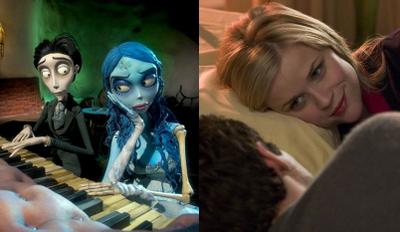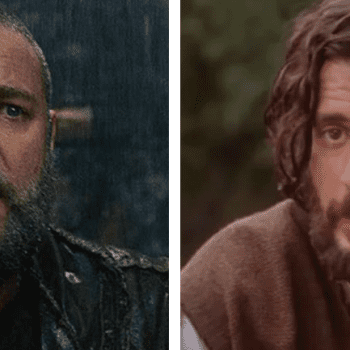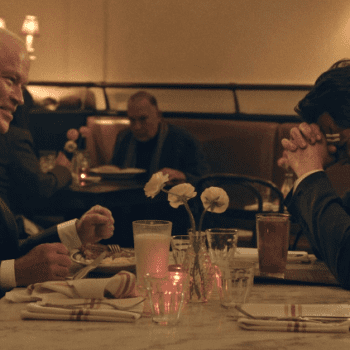
Two films open today, one in wide release and the other in limited, and both concern romances between a man who is living and a woman who, um, isn’t, exactly. (In one film, she’s a ghost; in the other, a corpse.) That’s about all Just Like Heaven and Corpse Bride have in common, apart from one other thing: I like ’em both.
There is little I can say about Just Like Heaven that hasn’t already been said as well as it can be by my colleague Steve Greydanus. All I would add is that Donal Logue gets the funniest line — you’ll know it when you hear it — and I really, really like the music. I was a huge fan of the Cure’s ‘Just Like Heaven’ in my late teens and early 20s, and hearing it again — next to songs by the Cars and others — brought back happy memories. Plus I rather liked Rolfe Kent’s score, which seemed a bit John Barry-ish in places. You can listen to a short Real Audio clip of it here — the contrast between the high and low strings, the distinct use of flutes and horns, and a few of the chord changes especially come to mind (though bits of it, especially in the second half, would be a tad perky for Barry, I think). Basically, it’s a nice cream puff of a movie, overall.
Meanwhile, Corpse Bride is quite possibly the best film Tim Burton has made since Ed Wood (1994), if only because it is the least uneven. While the film is made in stop-motion animation, many of the voices are culled from recent Burton films like Charlie and Chocolate Factory (2005) and Big Fish (2003; my review), and I especially love the way Christopher Lee growls all his lines as the town’s dour, authoritarian, and corpsophobic local minister.
(The minister’s a bit of a religious stereotype, I suppose, but I can live with that. Interestingly, he is addressed as “pastor”, and never “father” or some such word, yet the church he lives in seems to be a mix of Catholic rose windows and Orthodox onion domes — which kind of fits, actually, since the film is based on a Russian fable yet all the characters speak in British accents and talk about eating “crumpets” and that sort of thing, so there’s a definite mix of east and west on that level. But for all I know, I may just be revealing how little I know about cultural architectural forms.)
I loved the homages to Ray Harryhausen, Peter Lorre, and the original Disney Silly Symphony The Skeleton Dance (1929). And I loved the scenes where Victor bonds with the women over their shared interest in the piano. (For those scenes alone, I wished my sister Michelle, who is studying music at UVic, had been in the theatre with us.) And I liked the music in general, period.
I also appreciated the story’s fable-like nature, in which Victor (Johnny Depp) and his Corpse Bride (Helena Bonham Carter) prove themselves virtuous in some way or other; Victor’s fiancée Victoria (Emily Watson) might do this too, but I can’t think of a specific example right now. Anyway, there’s a nice recurring theme of self-sacrifice, and it is also interesting to see how Victor doesn’t choose either of the women that he is attached to — his engagement to Victoria is the work of his nouveau riche parents and her bankrupt “old money” parents, and his “marriage” to the Corpse Bride is a complete accident — but Victor does choose to commit himself to each of these partners, at different points, once he accepts that he is already committed to them for reasons that had nothing originally to do with his intentions. In a way, it’s a nice illustration of the principle that we should love the one we are married to, rather than — as our post-Romantic culture would have it — that we should marry the one we have feelings for.
I am also intrigued by the film’s conclusion. Leaving aside the villain who is dealt with in a manner that skirts the line between “justice” and “revenge”, there is something about the resolution of a certain character’s arc that points in a direction the rest of the film hadn’t been necessarily going. For the most part, this film suggests that the dead are just like the living, only they reside beneath the earth instead of above it; it’s not that different from how the ancient Hebrews and Greeks imagined She’ol or Hades. But the final moments in the film are a little more, dare I say it, transcendent; they point up, instead of down, which is a good thing. Then again, they also suggest a dissolution of personality, rather than a restoration of personality to wholeness, which is not so good; perhaps this is unfair, but the sequence in question reminded me of Philip Pullman’s ‘His Dark Materials‘.
I’ll let that ambiguity be, though, at least until I see the film a second time; there is certainly enough here to make a second trip worth the effort. And I really want an audio file of Christopher Lee bellowing the words, “Young man — LEARN YOUR VOWS!”
UPDATE: I must also pay tribute to the spiders who stitch Victor’s suit, a la the mice and birds who made the dress for Cinderella (1950) way back when, and all while singing something that sounded like Gilbert & Sullivan. And I also got a kick out of the scene in which Victoria tells her parents that she saw Victor and his Corpse Bride in her bedroom, and her stern mother (Joanna Lumley), completely oblivious to the spooky implications of what Victoria has just said, replies, “There was a man in your room?”












